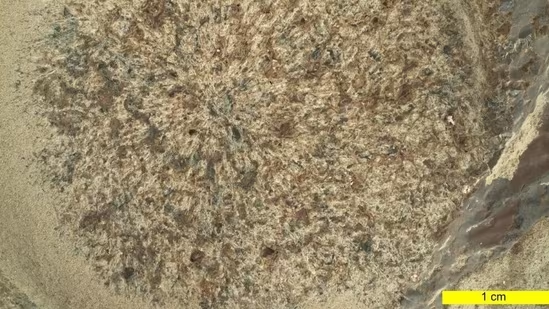Rover uncovers Martian ‘diverse organic matter’, insights into Mars' search for extraterrestrial life
NASA's Perseverance rover has made a groundbreaking discovery on Mars, detecting diverse types of organic molecules in the Jezero Crater.

Scientists believe that these organic materials could potentially have a "biotic" origin, originating from life on the planet. But, they also acknowledge the possibility of alternative explanations, such as the interaction between water and dust or the deposition of organic matter by dust or meteors.
The presence of these organic molecules suggests that Mars may have had a much more active past than previously thought, with significant implications for the search for extraterrestrial life.
Understanding the nature of Martian organic matter could provide insights into the availability of carbon sources, thereby influencing the quest for signs of potential life.
The Perseverance rover's Scanning Habitable Environments with Raman and Luminescence for Organics and Chemicals (Sherloc) instrument played a crucial role in this discovery. Sherloc is the first tool capable of mapping and analyzing organic molecules and minerals on a fine scale on Mars.
ALSO READ| Insider reveals Harry and Meghan ‘know they’ve gone too far' in royal criticism
The Jezero Crater, where Perseverance landed in February 2021, is an ancient lake basin with the potential for past habitability. Since its landing, the rover has been utilizing its suite of instruments to investigate the geological composition of the crater floor.
Researchers Sunanda Sharma, Ryan Roppel, and their team examined data from two formations within the Jezero Crater. The Sherloc observations detected signals of organic molecules in all 10 targeted locations, with a higher concentration in the Maaz formation compared to the Seitah formation.
The data also revealed distinct mineral associations and spatial distributions, potentially unique to each formation.
Even if these organic materials are not of biological origin, they still provide valuable clues about Mars' potential to support alien life.
Ashley E Murphy, a researcher at the Planetary Science Institute and co-author of the study, explains, “Not all organics are biological in origin. Observing spatial relationships between minerals and organics is necessary when evaluating organic origins and potential biosignatures. Everything we know of life on Earth is limited to what is preserved in the rock-mineral record. On Earth, biosignatures are found in certain minerals and some minerals are better at preserving organics than others.”
“Mars may have had a similar early geologic history to Earth so we use our knowledge of life as we know it on Earth for where to look for potential evidence of past life on Mars. Mapping organics allows for a better understanding of if the Martian carbon cycle is similar to or different from Earth, and the potential of Mars to host life.”
The diversity observed among these organic-mineral associations on Mars provides insight into different mechanisms by which organic matter may have originated. It could be the result of water deposition or interactions with volcanic materials.
In their article published in the journal Nature, the researchers highlight the prevalence of aromatic molecules on the Martian surface and their persistence despite exposure to harsh environmental conditions.
ALSO READ| ‘We are vastly out of our league’, Tennessee lawmaker gives a grim warning after classified UFO footage
These organic molecules are often found within minerals associated with aqueous processes, indicating the potential role of these processes in organic synthesis, transportation, or preservation.
The latest findings open up new avenues for exploration and add to the growing body of evidence suggesting the potential habitability of Mars.
The study titled "Diverse organic-mineral associations in Jezero crater, Mars" is published in the journal Nature, providing significant contributions to our understanding of Mars' geological and astrobiological history.
Disclaimer: The copyright of this article belongs to the original author. Reposting this article is solely for the purpose of information dissemination and does not constitute any investment advice. If there is any infringement, please contact us immediately. We will make corrections or deletions as necessary. Thank you.
Title:Rover uncovers Martian ‘diverse organic matter’, insights into Mars' search for extraterrestrial life
Url:https://www.investsfocus.com









